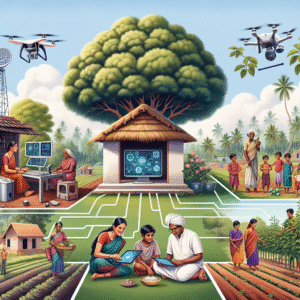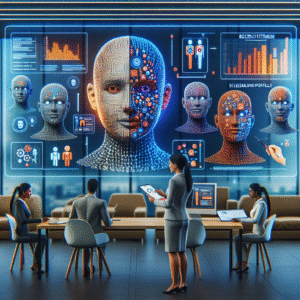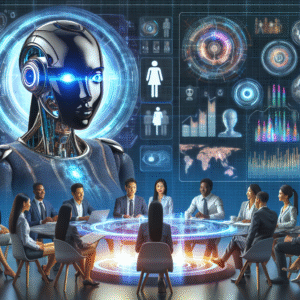Exploring AI Tool Trends in 2025
Estimated reading time: 5 minutes
- Discover how AI technology is revolutionizing recruitment processes.
- Learn about the key trends in AI tools expected for 2025.
- Understand the practical applications of AI for HR professionals.
- Explore integration examples across various industries.
Table of Contents
- The State of AI in 2025: A Quick Overview
- Key AI Tool Trends for 2025
- Industry Integration Examples
- Conclusion: Embracing AI in Recruitment
- FAQs
The State of AI in 2025: A Quick Overview
Recent studies indicate a burgeoning interest and adoption of AI tools across various sectors, including recruitment. AI trends in 2025 predict significant growth in autonomous agents, hyper-personalization, and advanced predictive analytics. The trajectory of these developments points toward strategic enhancements in business processes, particularly in sectors such as marketing, software development, and market research.
For instance, AI agents are expected to handle increasingly complex tasks autonomously, thereby streamlining workflows at work. This means HR professionals and recruitment specialists can focus more on strategic decision-making rather than mundane tasks. Moreover, the adoption of generative AI tools has soared from 55% to an impressive 75% among leaders, marking a definitive shift from experimentation to full-scale implementation of AI solutions in business operations.
Let’s delve deeper into some key AI tool trends projected for 2025 and discuss practical takeaways for recruitment professionals and HR teams.
Key AI Tool Trends for 2025
1. AI Agents with Greater Autonomy
The emergence of autonomous AI agents marks a pivotal trend. These agents can execute complex tasks independently, reducing the need for human oversight. This is critical in recruitment, as AI agents can facilitate automated candidate screenings, schedule interviews, and manage communications, all while refining and adjusting their approaches based on previous interactions.
Practical Takeaway: HR teams should consider implementing AI-powered tools to manage routine tasks, allowing professionals to concentrate on higher-value activities such as candidate engagement and strategy development.
2. Generative AI Adoption
The rise of generative AI tools like ChatGPT and Claude signifies a shift in how businesses approach content creation and communication. In the context of recruitment, these tools can assist in drafting personalized job postings, creating engaging content for social media, and even generating tailored messages for candidate outreach. With substantial funding flowing into these technologies, their capabilities are set to improve drastically.
Practical Takeaway: HR departments can utilize generative AI for crafting job descriptions and engagement content, ensuring a consistent and appealing narrative across platforms.
3. Advanced Predictive Analytics
Predictive analytics powered by AI allows organizations to forecast future hiring trends based on various market factors. As businesses accumulate large datasets from their operations, predictive analytics can analyze this data to identify trends, optimize recruitment strategies, and refine job propositions based on candidate preferences.
Practical Takeaway: Recruiters should invest in AI tools that leverage advanced analytics to make data-driven decisions about applicant sourcing and talent management.
4. Hyper-Personalization
AI’s capacity for hyper-personalization allows the crafting of highly tailored experiences for candidates based on their behaviors and preferences. AI systems can analyze past interactions and recommend tailored job listings or benefits that align with individual candidate aspirations. This enhances candidate satisfaction and increases the likelihood of successful placements.
Practical Takeaway: Utilizing hyper-personalization can significantly improve candidate engagement, which is crucial for maintaining a competitive edge in recruitment.
5. Automation of Routine Tasks
One of the most appealing aspects of AI is its ability to automate labor-intensive processes. Tasks such as data entry, initial screening of resumes, and even report generation can be automated using AI tools, giving HR professionals more time for strategic initiatives and improving overall operational efficiency.
Practical Takeaway: Identify repetitive tasks within your HR department that can be automated to allow your team to allocate time toward strategic planning and relationship building with candidates.
6. AI in Marketing for Recruitment
AI tools are redefining how recruitment agencies interact with potential clients and candidates alike. They enable real-time analysis of candidate and client interactions, improving targeting strategies for recruitment efforts and enhancing engagement outcomes. Advanced algorithms can mine structured and unstructured data, thus refining customer outreach strategies.
Practical Takeaway: Leverage AI-driven marketing tools to enhance recruitment campaign effectiveness, ensuring that marketing strategies align with the unique needs of your audience.
7. AI-Powered Chatbots and Virtual Assistants
The evolution of virtual assistants has taken a substantial leap. Current AI-powered chatbots are not just reactive but proactive, resolving complex issues without human intervention. In recruitment, chatbots can assist candidates throughout their application journey, answering common questions and providing information in real-time.
Practical Takeaway: Consider integrating sophisticated AI chatbots into your recruitment process to enhance candidate experience and streamline communication.
8. Human-in-the-Loop Augmentation
While many AI tools demonstrate remarkable capabilities, a critical trend in AI deployment is the emphasis on human collaboration. AI systems supplement human input, enhancing decision-making in recruitment practices. Experts often note that AI systems can surpass humans in specific tasks, but this collaboration can lead to optimal decision-making and better outcomes.
Practical Takeaway: Focus on training your HR personnel to work effectively alongside AI systems to harness the full potential of these technologies while ensuring a human touch in recruitment.
9. AI for Software Development
AI technologies have also made significant inroads into software development, offering tools that can speed up coding, automate testing and enhance software reliability. Such advancements facilitate the technology stack used in recruitment software systems, improving their overall performance.
Practical Takeaway: Stay updated on AI advancements in software development to select the best recruitment tools that can adapt quickly to growing needs.
Industry Integration Examples
As AI technology evolves, various industries are witnessing transformative impacts, especially health care and IT:
- Healthcare: AI tools have shown exceptional results in supporting clinical decision-making. The incorporation of AI into healthcare insights highlights the potential for enhanced patient care, which parallels the need for effective candidate assessment in recruitment.
- Cybersecurity: With the emergence of adaptive AI solutions, businesses can now detect and mitigate threats effectively, reflecting the importance of integrating secure processes in recruitment data management.
- IT Operations: AI’s predictive capabilities in IT optimize infrastructure, which closely aligns with the need for streamlined recruitment processes.
Conclusion: Embracing AI in Recruitment
The AI tool trends for 2025 center on a more profound integration of autonomous agents, predictive analytics, and hyper-personalization across industries. For HR professionals and recruiters, embracing these trends is not just about keeping up with technology; it’s about transforming recruitment processes to enhance efficiency and candidate experience.
By leveraging AI tools, recruitment teams can streamline operations, make data-driven decisions, and build more meaningful relationships with candidates. As the landscape of recruitment evolves, our consulting and automation services are here to guide organizations in harnessing these technologies effectively.
If you’re ready to explore how AI can reshape your recruitment process, feel free to contact us to learn more about our specialized consulting and workflow automation services. Together, we can lead your organization into the future of recruitment!


